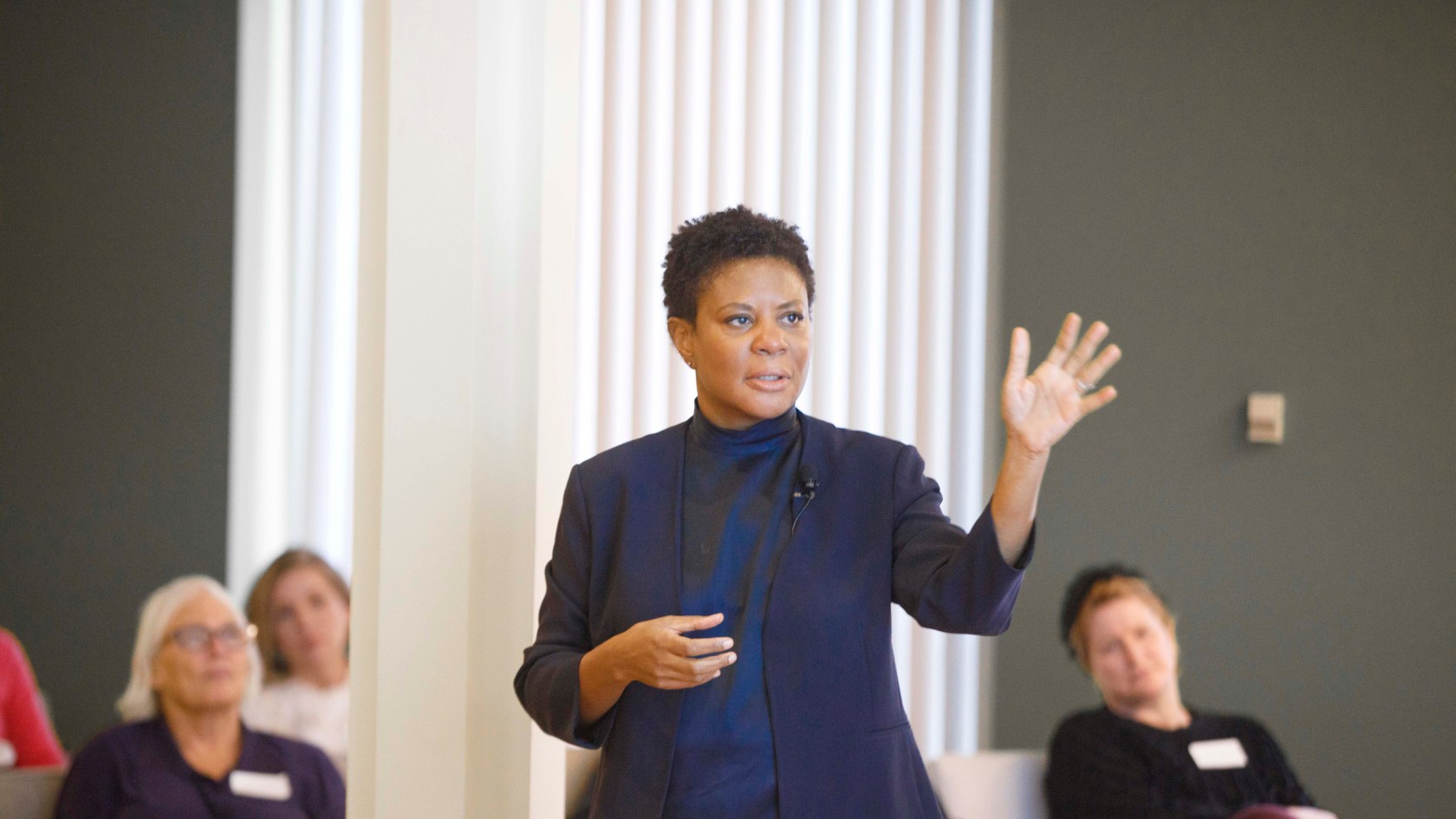
“The ability to start something new and to imagine how we as social scientists might do our work differently is tremendously exciting,” said Alondra Nelson.
Photos by Kris Snibbe/Harvard Staff Photographer
Need for moral revolution
Social scientist, former Biden official Alondra Nelson says work of new Center for Race, Inequality and Social Equity can help shape policy, progress
In 2016, President Barack Obama delivered a historic speech at Hiroshima’s Peace Memorial Park that recalled a tragic past but saw an imperative for a better future.
“He didn’t apologize for the United States’ role in nuclear warfare,” Alondra Nelson said. “What he said is that the scientific revolution that led to the splitting of an atom requires a moral revolution, as well.”
Nelson, the Harold F. Linder Professor of Social Science at the Institute of Advanced Study, was the featured speaker this month for the launch of Harvard’s Center for Race, Inequality and Social Equity Studies (CRISES). Founding members of its executive committee and supporters from various social science departments gathered at William James Hall to hear the former director of the White House Office of Science and Technology Policy (OSTP) discuss how research like theirs can help shape policy and progress alike.
“The ability to start something new and to imagine how we as social scientists might do our work differently is tremendously exciting,” Nelson said.
Lawrence D. Bobo, CRISES founding director and Social Sciences Dean, opened the event with a bit of background on the new center. “As many will recognize, the name is a tip of the hat to W.E.B. Du Bois and ‘The Crisis’ magazine he launched for the NAACP,” said Bobo, who got the idea for the center in 2020 amid the pandemic’s unequal impacts and news of a Minneapolis police officer murdering George Floyd.
Du Bois wrote that his aim was to publish news, opinion, and cultural expression to “show the danger of race prejudice.” Likewise, CRISES will lean into empirically grounded, methodologically rigorous social science research that illuminates racial realities while “informing and guiding the attainment of a world without invidious ethno-racial inequality,” said Bobo, who also holds the title of W.E.B. Du Bois Professor of the Social Sciences.
“As many will recognize, the name is a tip of the hat to W.E.B. Du Bois and ‘The Crisis’ magazine he launched for the NAACP.”
Lawrence D. Bobo

The kickoff proved a perfect occasion for Nelson’s remarks on the country’s move toward greater emphasis on data-driven, evidence-based policymaking. Obama was the first U.S. president to appoint a chief data scientist while opening up access to raw information collected by the federal government. This work continued in 2018 with passage of the Evidence Act, championed in part by former Republican House Speaker Paul Ryan, which bolstered the collection and use of statistical measures to evaluate policymaking.
As surprising as it might seem to some, Nelson indicated that the academic community was “not really involved” in bringing about this change. “It was happening in the tier of think tanks and non-academic research organizations.”
The social scientist also detailed recent government efforts to improve equity. She noted that President Biden took office in 2021 with a first-day Executive Order on Advancing Racial Equity and Support for Underserved Communities Through the Federal Government. A week later came his Memorandum on Restoring Trust in Government Through Scientific Integrity and Evidence-Based Policymaking.
As head of the OSTP under Biden, Nelson immediately saw the urgency of building bridges with academics who specialize in equity. “It was shocking to hear colleagues in government, many with Ph.D.s in social science, say they actually had no engagement with scholars in the social sciences,” Nelson shared.
One of those bridges took the form of the Analytics for Equity Initiative, piloted by the National Science Foundation. It directly links social scientists to federal agencies with unanalyzed data, while also providing guidance on the types of research questions policymakers want answered. Already, the program has yielded studies on everything from improving occupational safety across demographics to tracking the effects of air pollution on maternal and child health in underserved communities.
“These are projects you can imagine folks at CRISES taking on,” Nelson said.
On the CRISES executive committee are Harvard faculty members Caroline Elkins, professor of history and African and African American studies and Thomas Henry Carroll/Ford Foundation Professor of Business Administration at the Business School; Taeku Lee, Bae Family Professor of Government; Ellis Monk, professor of sociology; Orlando Patterson, John Cowles Professor of Sociology; Robert J. Sampson, Woodford L. and Ann A. Flowers University Professor; Guy-Uriel Charles, Charles Ogletree, Jr. Professor of Law and faculty director of Charles Hamilton Houston Institute for Race & Justice; Mary C. Waters, John L. Loeb Professor of Sociology; Mahzarin R. Banaji, Richard Clarke Cabot Professor of Social Ethics; Tommie Shelby, Caldwell Titcomb Professor of African and African American Studies and of Philosophy; and Sandra Susan Smith, professor of sociology, director of the Malcolm Wiener Center for Social Policy, and Daniel and Florence Guggenheim Professor of Criminal Justice at Harvard Kennedy School. Bobo has also brought on director of administration and operations Meenakshi Verma-Agrawal and research scholar Jennifer Perry.
The center’s agenda includes topical conferences, workshops, and more guest speakers. CRISES also plans to hire postdoctoral researchers, much like those appointed by Harvard’s Inequality In America initiative, while providing space for faculty to delve into topics related to racial transformation. An immediate project is designing, implementing, and analyzing the inaugural CRISES survey on race, diversity, and democracy in the U.S.




